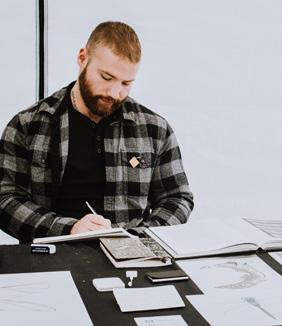
2 minute read
Handling Difficult Conversations
INDIGENOUS ARTIST
“We all come from a wealth and great people. Don’t let anyone tell you different.” —Kevin Cranmer
Working in the public is rewarding, but it can also bring up difficult conversations and topics. You will encounter people from all over the world, from different cultures and with different levels of understanding.
Tips for handling difficult conversations:
Invite guests to learn more within the cultural site where you are located (e.g., museum galleries or exhibits). You may choose to say something like, “That may be your understanding, but that is not my experience,” which could lead to you sharing your personal perspective. Many will be looking for a reaction; do your best to not give them the rise or debate they are looking for. If the situation escalates, contact your program coordinator, an employee or security.
Tips from artists:
“Try to be as knowledgeable as you can—know who you are and where you are from.” —Sarah Jim
“If you begin to feel unsafe, tell the other artists around you. Know that you have support around you.” —Sarah Jim “In a lot of instances, it comes down to life experiences, for me. I have experienced racism from when I was five years old. As soon as we have learned right from wrong, we have had to deal with racism. You see it enough that you can recognize it almost right away—for example, when people are passive aggressive or playing ignorant on purpose. You can either share information or if you are feeling in that moment the direction that it is going to go is negative, you can ignore it or you can just walk away. Take yourself out of the situation to avoid saying things you might not want to.”
—Virgil Sampson
INDIGENOUS ARTIST
HANDLING DIFFICULT CONVERSATIONS
(continued)
Tips from artists:
“Spend time with Elders and learn who you are. Knowledge of oneself, the history of who you are and where you come from goes a long way.” —Kevin Cranmer “I was once at a swap meet and this older man was being rude to this one seller and offering him a very low price for what he was selling. It made me upset, and I was just watching. The seller however did not get upset; he just said ‘No thank you, but thank you for the offer.’ This really taught me that no matter what, it is always better to be polite than to react angrily.”
—Doug LaFortune
“There are a lot of instances where preconceived notions come up. They look down on you and think that intellectually you won’t be able to respond to them. If you have a knowledge of yourself and this country’s history, you have nothing to worry about, because it is all true.” —Kevin Cranmer “As an artist, and Indigenous person, you have the right to say no to guests asking about personal information and about histories.” —Teresa Vander Meer-Chassé





